#taoist practice
Text
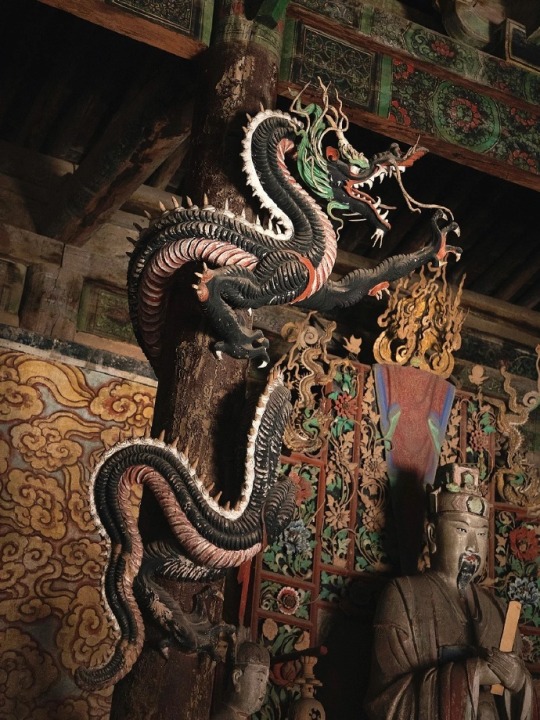
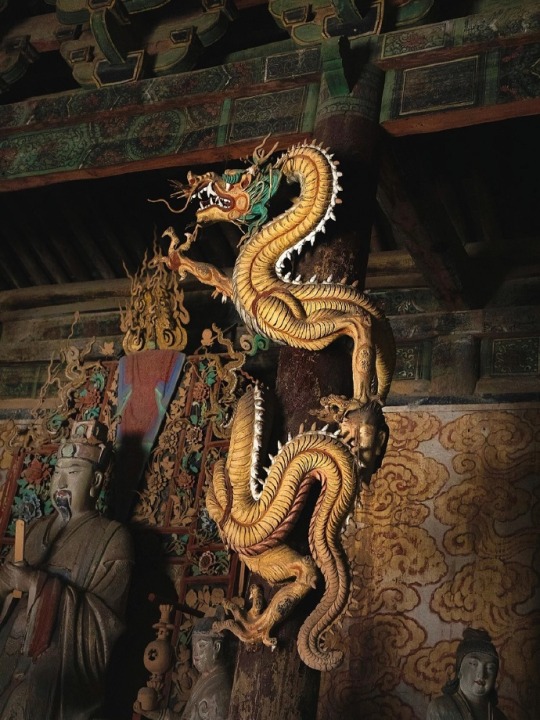
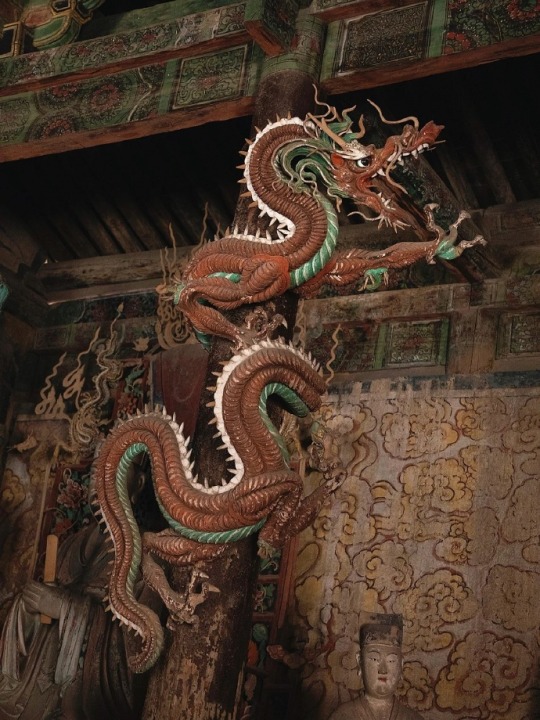
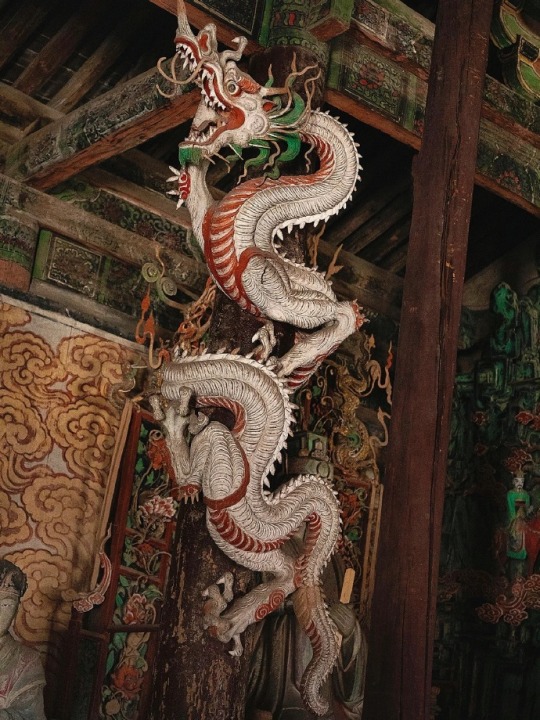

Mythological Realism: Elemental Dragons
Four-color coiled dragons on the pillars of the Supreme Talisman (Taifu) Temple (太符觀).
The dragons are painted in the colors of the primary elements, embodying the archetypal creative forces. In Chinese religious art, almost any concept can be expressed in the language of dragons.) Their children, descendants and relatives frolic on the temple walls among curly clouds.
In view of the striking liveliness, I would classify these images as mythological realism.)
Since its construction in the fifth year of the Jin dynasty (1200), the temple has been repeatedly expanded and supplemented with new buildings over the centuries. Most of the surviving statues are from the Ming dynasty.
The Supreme Talisman Temple is located in Fenyang (汾陽), Shanxi.
Photo: ©故尔耳
#ancient china#chinese culture#chinese art#chinese mythology#ming dynasty#taoist practices#religious art#chinese temple#Taoist temple#taoism#taoist#statue#sculptures#statues#daoism#jin dynasty#dragon#dragons#dragon art#creatures#wood carving#woodworking#temple architecture#wooden architecture#wooden buildings#chinese architecture
389 notes
·
View notes
Text
His sole concern was to eat three meals a day and to sleep soundly at night. Having neither duties nor worries, he was free and content to tour the mansions and meet friends, to make new acquaintances and form new alliances at his leisure.
Me: Wow, I didn't believe that giving Sun Wukong an empty title (again) would work, but it seems that this time is actually working! Who knew that simply leaving Monkey be just like in Flower - Fruit Mountain would have such good results, they only needed to leave him happy!
The fucking title of the chapter:
Disrupting the Peach Festival, the Great Sage steals elixir; With revolt in Heaven, many gods would seize the fiend.
Me: Oh.
#Who... Gives a monkey. A MONKEY#The job of taking care of a bunch of heavenly and delicious fruit#They really thought that the monkey wouldn't eat the immortal fruit#Patriarch Subodhi don't look at your disciple his ass is not practicing taoist principles!#journey to the west daily#Jttwdaily#journey to the west#sun wukong
12 notes
·
View notes
Note
hi! I'm here from your (very hot btw) 'NMJ has to bottom for medical reasons' fic, thank you for writing it! In addition to the stellar characterization and prose, I love how you've delved more into how the Nie sect and the saber curse works! I also really liked the mention of the Nie sect encouraging men from minor sects to marry into the clan instead of the women marrying out, because it helps make sense of why the Nie sect was able to stay as powerful as it does while its best practitioners are fated to die relatively young from qi deviation.
Now, I know the "saber cultivation has the side effect of amplifying yin-essence" effect in your fic is set up to explain why NMJ needs to get dicked down for his health, but... do you have any ideas about what it might be like for female Nie cultivators in canon? like, would it have been equal opportunity qi deviation, or would women be discouraged from training too much/attaining too high of a cultivation level bc sexism (the duty to rear children), or some secret third thing? iirc there's no canon info on female Nie cultivators anyway, so I'm curious about what you would find plausible given the constraints of canon, since your approach to this aspect of worldbuilding is so thoughtful in your fic
again, thank you for sharing this story with us! hope you have fun writing the next part :3
Thank you for the praise, this is so nice!! Anyway sure i love talking baout my overly convoluted and silly worldbuilding.
So in the fic, the yin-excession caused by saber cultivation is generally minor, and only becomes a real problem for Nie Mingjue once xiyao start playing clarity for him. (And even then only because it was enhanced by liu-leaf. It's not relevant but I wanted to say it: Liu here is the character 流 which means "to flow." It's not a real plant. I made it up. But becuase it's my plant I get to say that it's actually a blood thinner, which is where it gets its name from. It was discovered by Wen doctors, who also figured out it made cores flow more easily too, but they kept that part a secret. Until now.)
Essentially: Yin is characteristic of darkness, and of destruction, and therefore is acquired disproportionally via saber cultivation which gains its power from death, as well as blood. (The blood's also relevant because multiple of the "zang" organs (heart, liver, spleen, kidney, and lung.) Either store, contain, or govern blood, and these are the organs which are considerd to be yin in nature, contrasted by the "fu" yang-natured organs: the small and large lintestine, gall bladder, urinary bladder, stomach and the san jiao. So absorbing blood, like he sabers do, is yin-natured)
(please remember this is not accurate chinese philosophy, it's fanfiction sex magic. I'm referencing real concepts but I'm not intepreting them properly!)
Contrastingly, despite countering the buildup of resentful energy that saber cultivation also causes, Clarity doesn't fix the yin-exessive nature. It makes it worse. Because Yin is also passivity, while Yang is activity. Clarity's soothing and claming nature means that it favours Yin over Yang (again i'm just making shit up here.) Essentially: it solves the main problem while accidentally making a secondary problem worse.
For most cultivators, Yin imbalance won't get you before the resentful energy does. But, as per the fic, the imbalance can actually make your core more vulnerable to said qi deviation.
Because dual cultivation helps, female Nie cultivators actually notice less of this problem... as long as they marry a man that doesn't practice Nie cultivation. Marrying within the clan, or not getting married at all, would shave a few years of your lifespan. And would leave you more vulnerable to yin-excessive imbalance than an unmarried man since your core is already naturally more yin oriented.
Now, whether this means that they'd be encouraged to train less? No, not really. In fact, it doesn't seem that "you're gonna die young" is a deterrent to any Nie training less! (of course we hear rather little of uh... any Nies that are not nmj or nhs. But the version of them I've made up is like that)
They hold martial strength in such a high regard that they're willing to take the inherent risk of saber cultivation, and so this risk being slightly higher for unmarried women makes no difference in this ideal.
Of course there is an added pressure for any women who might not want to marry outside the sect, or marry at all, but that's just a stronger version of the pressure that exists for any woman in a patriarchal society that practices arranged marriages like the one in mdzs. It's technically allowed, (Du Kangli, Nie Fengyong's husband, is actually from a family that has been with the Nie for generations, and practices saber cultivation himself) but discouraged, especially if the women in question are strong cultivators who have reached the stage where qi deviation starts to become a real problem.
One thing that does cause a bit of a problem is that, as I mentioned, once sabers get strong enough they also get pissy when they're not fed with beast blood on a regular basis. Baxia only getting fed shitty human blood for 3 years straight is one of the reasons NMJ's qi deviation is coming abnormally early even for a Nie sect leader.
That causes a bit of an issue when pregnant or recovering from pregnancy. Instead of one whiny baby asking to be fed all the time, you now have two! So the Nie basically have "maintenance" hunts, where pregnant women, or those recovering from birth or injuries, are accompanied by other cultivators whose job it is to trap the beast and set her up for an easy kill to satiate the saber with minimal danger.
#mdzs#asks#mdzs headcanons#fic writing#a safety concern#my headcanon is that nie troops did sometimes take breaks from the war to go hunting for exactly this reason#but as the general of the whole campaign nmj couldn't afford to and so he didn't#if you want EVEN MORE worldbuilding tangents: the idea that nmj isn't allowed to come is also a reference to a real taoist sex practice.#look up huanjing bunao#and please imagine my face when i did that cursory research into the historical origins of dual cultivation and discovered this#it was joy by the way. big evil smile because i knew immediately that i was gonna put it in the fic. rip to nmj's dick
11 notes
·
View notes
Note
I was reading some Chinese texts and stories, and I have seen that while the immortals have their magic, they despise sorcery. Why is sorcery seen as negative by immortals and why are they different? (like, I think it's mentioned that Shen Gongbao relied more on sorcery even thought he has an immortal teacher)
I'm afraid I don't quite understand the English difference of how 'sorcery' and 'magic' are different things let alone how the translator from what you read translated the original characters. I have never seen any king of cultivation in Daoism being translated as 'sorcery' so I can't say what really say what the original characters could be talking about. It could be talking about 巫术 which I think sometimes include blood rituals but never seen in stories as something ‘bad’ or even acknowledged in Daoist stories. If anything, I think they were more regarded as doctors with unusual methods and fairly good with technology. But I really only seen it to describe Western wizards/witches the most so I cannot say how mush it is used in Daoist stories.
As far as I have been aware Shen Gongbao uses cultivation just as any other immortal and I do not think that he has ever killed/taken his cultivation from any other living creature. That is the only thing I can assume would be 'bad' as it is feeding off another's life force or perhaps even just meaning 'using cultivation for trouble.' I recall that most of his 'evil' deeds come more from Shen Gongbao's ability to manipulate people are his words and being a vengeful man rather than anything dark with his cultivation.
The best guess I can give you is that Shen Gongbao in your translation is the bad guy of the narrative and thus the term 'sorcery' has negative implications in Western term and that is why it is used. Similar to how 'fairy' is used for 仙 when 'immortal' is more proper but this chance depends on whether the immortal is a woman or not.
You can take a read yourself but I think it is just a translation preference.
"Taoism branched from witchcraft. During the Jin and Tang dynasties, due to the participation and compilation of literati and the absorption of a large number of Buddhist scriptures and theories, the original religious form of witchcraft and Taoism became theorized, and Taoism developed a large distance from witchcraft. Taoism has since risen to the level of the upper ruling class, while shamanism has continued to flow among the people. Since the ruling class in history banned witchcraft and " obscene sacrifices" from an orthodox position, the survival of witchcraft has become very difficult. Therefore, witchcraft began to seek survival and a way out. First of all, it was to get closer to Taoism. So that the people also agree that they belong to Taoism. As this development continued, witchcraft and Taoism gradually merged, forming a form of shamanism consisting of both witchcraft and Taoism, and the "two gates of Taoism and Law", namely internal witchcraft and external Taoism.
First of all, shamanism must identify Taishang Laojun , the ancestor god of Taoism , as its leader to confirm that shamanism also belongs to "Laojun's religion" or "Laojun's sect". So based on the legend of Laozi , I compiled the origin of Taishang Laojun, thinking that witchcraft became the original version of Taoism. In addition to moving Taishang Laojun, Zhang Tianshi , Sanqing , Sanyuan, Sanguan, Wuyue , Sidu , Xuantian God and many Taoist gods were also moved into the witch altar, and they were named "Taishang Wuling Laojun" Or "The Supreme Three-Yuan Heart Zhengfa", "The Supreme Five Thunder Purple Micro Thunder Court" and other titles were listed on it, and they absorbed a large number of Taoist scriptures such as "The Supreme Sutra of Changing Purity", "The Supreme Xuantian Miao Sutra", "Tai Shang Zi Wei Treasure Repentance", "Tai Shang Laojun Xing Treasure Repentance", "Three Officials Sutra", "The Three Officials of Heaven, Earth and Water to Eliminate Disasters and Sinless Confessions", "Eleven Days", "South Dou Sutra", The Beidou Sutra and other sutras and confessions are enriched in the witchcraft and Taoist altar with Taoist rituals.
- "A Discussion on the Formation of Witch-Tao Culture in the Symbiosis Cultural Circle" by Ye Mingsheng
#anon ask#anonymous#anon#ask#Shen Gongbao#fsyy#fengshen yanyi#romance of the three kingdoms#thee kingdoms romance#investiture of the gods#again I'm not really familiar with a lot of these terms#I would suggest people doing their own research because there is so much overlaying information and practices that I cannot begin to#summarize into something generalizable and esp with something like shamanism and how the evolution of these practices either differ or merg#there are thousands of years of history not to mention interconnections that could be layered or nuanced and am not an expert when it comes#to the changes of laws and how this effects in hundreds of years of different dynasties#personally still think it's just a translation choice since Shen Gongbao is a Taoist immortal and REALLY hasn't done anything that could be#considered out of the normal for any other immortal when it comes to his powers at least. Just that he is a jerk. But not enough of a jerk#to stop being given titles in heaven and still being seen as an important figure#take it as you will
10 notes
·
View notes
Text
#look idk why but this song reminds me of Xie Lian for some reason???#maybe it’s the whole Taoist thing and the throat singing kinda goes with that vibe#but whenever I listen to it I always think of him lmaooo IDK#xie lian playlist#????#and#hapkido playlist#bc lbr this song actually bangs for practicing forms#music#apple jams 🍎#satxri#yamanooto#satxri yamanooto#Spotify#jiyuna seishin
1 note
·
View note
Text
Dragon on fire
The fire of the dragon of Sar Kong was seen again last evening, making a reappearance on the streets around its lair at the Mun San Fook Tuck Chee temple. The temple introduced the fire dragon dance in the 1980s, importing a tradition from Tai Hang Village in Hong Kong that has its origins in 1880. Mun San Fook Tuck Chee’s dance of the fire dragon, which usually makes an appearance once every…

View On WordPress
#Cultural Practices#Dragon Dance#Festival#Fire Dragon#Fire Dragon Dance#Forgotten Places#Mun San Fook Tuck Chee#Mun San Fook Tuck Chee Temple#Old Places#Photographs#Photography#Religious Festivals#Religious Practices#Religious Traditions#Singapore#Taoist Practices#Taoist Temple#Traditions
2 notes
·
View notes
Text
Inspired by a discord discussion.
I keep seeing characters from snowy places portrayed as unbothered by cold or missing it, and every time I remember that it's completely counterintutive if you didn't grow up in freezing temperatures
So I thought I should write this post.
We are very bothered by cold. We are way more bothered by cold than southerners. Being bothered is what keeps you safe. Warmth is a resource.
There are few lucky people who simply never get cold (mostly guys of endomorph body type) but it's not a given and generally northerners start to complain and wear warm coats at the tiniest hint of cold.
Humans can only adjust up to a certain threshold.
For example, Irish and British winters allow you to ignore weather almost completely (you'll be miserable but you'll probably live), so there's a culture of stoicism, not heating your house above 16-18°C (60-65°F), wearing shorts and sandals (and a Very Big Scarf) when it's snowing and all that.
(I quickly got used to leaving the bathroom window open at 4°C when I was living there. who cares really)
So there's a common misconception that you can do the same with even colder weather.
However, once you are past that adjustment threshold (for most people it takes as little as -5..0°C/23..32°F lasting for more than a month per year) there can be no special built-in resistance to that type of cold (unless you are a yogi or a Taoist monk), instead you learn a bunch of behaviours that help you. You start to preserve warmth religiously.
You also start to differentiate between types of being cold and avoid some of them (some build up over time and it wears you down, so it's best to avoid them entirely). Anything that drops your core temperature (this is noticeable long before you start shivering, shivering is the equivalent of fire alarm) is a huge no. Fingers getting a bit numb from building a snow castle is nothing major though.
It can be hard to unlearn that even if you moved to a warmer place years ago.
Stoic northern characters who have moved to a warmer country are very likely to Complain About The Cold.
They'll start wearing coats at higher temperatures than southerners (because, well, the weather might get worse, or you might stay outside longer than you planned, or move less).
They'll get cold hands more often because their body panics at the tiniest signs of cold and diverts blood to the centre (my first impression of the Irish was how warm everyone was when we shook hands. I'm the same now).
Most will heat their houses to the point where it's possible to walk around in a t-shirt no matter how cold it is outside (those who don't will comment "thank gods that people don't do that in your country, I hated it back home").
They'll whine at +5°C (40°F).
Apart from heavier clothes they'll have a bunch of weird habits like Walking Really Fast when the weather is bad (it's for when you don't want to wear heavier clothes).
They might have a fondness for scarves and good winter shoes (warm shoes and a warm hat are even more important than a warm coat. the lack of hats in fantasy upsets me. scarves are less important but they are pretty).
When locals get surprised they'll reply with "yes, but this is *damp* cold, *dry* cold is different" (it's more complicated than that but this answer usually stops further questions, so we go with that).
It's not like they are actually less cold-resistant, they just take cold more seriously.
At the same time they can be weirdly unbothered by things that freak some of the southerners out because they know how their body deals with low temperatures and which things have no consequences.
(it's not something that you learn from books, it's practical knowledge of what you personally can get away with. for example, I often get completely numb thighs during winter walks, takes an hour to start feeling anything when I get home. but I know it's all right as long as my feet are warm and my core temperature is within normal range)
They also won't suffer consequences when it gets truly cold, while more nonchalant southerners won't notice when they get borderline hypothermic or just cold enough to get sick.
They'll probably consider -30°C (-22°F) exciting. It becomes enjoyable again, because the outside world is now a death zone and there's some macabre fun in resisting it. Oh, and your eyelashes get covered in frost and it looks dope. What's not to like.
Kids will make a point to eat ice cream outside in -30°C (no, they won't get sick from it). I can't explain it, it just works like that.
Generally people from colder countries are not bothered by cold if they can return to a warm place soon enough, it's the prolonged exposure to cold (even mild) they are worried about. Going out for a smoke without a coat is common.
If they are still in a cold country, it's also a bit different from what you expect.
There's a trope of drinking to keep warm. It doesn't work like that. You can drink alcohol to feel warm but not to keep warm and it's an important difference. When it's cold your body's proper response is to constrict blood vessels and to divert blood flow from extremeties to slow down the loss of warmth. Alcohol reverts that.
This means it's perfectly appropriate to drink eggnog or mulled wine at a fair (when you are supposed to get to warmth soon enough, so the illusion of not being cold is not harmful) or hard spirits when you get back from the cold (it will help you warm up faster), but not if you are staying in a cold place. During a hike through winter woods a thermos with sweetened tea and fatty food are your best friends.
Some won't know it and get drunk and frostbitten/hypothermic. People are stupid.
Food gets weird, fats start to seem even tastier than usual. People in Antarctic expeditions are known to crave sticks of butter. In certain weather sandwiches with frozen lard are delicious.
Anything can and will be made into tea.
Some tropes I personally disagree with.
Pain. Pain levels depend on the weather. Cold eases any kind of external pain (cuts or burns) but makes worse anything internal (broken bones, cramps, most headaches).
Hypothermia feels nothing like peacefully falling asleep. It's the most miserable state I've ever experienced, psychological trauma doesn't even come close.
Well, maybe there are people who do fall asleep but other people I've talked to seem to share my experience.
I'm not sure how exactly it works, I think it messes up your self-regulation, since most chemicals in your body require a certain temperature range to work properly. Basically you become Not Yourself. Your emotions go whack (usually it's either extreme self-pity or extreme anger). It feels awful. I hope you never get to experience it.
Most of us don't really miss cold.
Well, some perverts do, but there's a general consensus that cold is awful.
We do miss some things that only happen during cold days though. The stillness and the quiet or how pretty snow looks. How bright the stars are on a clear night. The colour of sunsets and twilight sky when it's freezing.
(in my opinion, the best experience happens around -5°C, it's already pretty but the world is not a death zone yet)
There's also an appreciation of contrast with things that are Not Snow.
Walking from the cold into a greenhouse with orchids.
Watching a blizzard rage outside your window while you sit in warmth with a cup of tea.
Jumping into a lake straight out of a sauna (then going back. do not do that if you have a heart condition).
Fireplaces. Holiday food. Mulled wine. Saffron in pastry.
There's also a lot of beauty in the world that is frozen. I keep stumbling upon the fact no one around me shares these experiences anymore and it saddens me.
The xylophone sound of first ice being broken by a passing boat.
Sea moving under the ice — when it's not too thick it rises and falls like some large animal breathing.
The whale-song-like sounds of ice cracking on large lakes.
There's a very special mood of waiting for first snow. The world is too cold and dark without it and then you wake up one night from the sudden quietness (snow muffles all sounds) and you know it's there even before you look out of the window,
There's the exhiliration of spring. The moment when the wind starts to have a scent — thawing snow smells a bit like watermelons but clearer. Winter smells like nothing at all.
The first tiny yellow flowers in mud. They are our hanami.
(I don't think anyone in Europe truly appreciates spring if they are not from Nordic or Baltic countries)
There's a certain attunement to the scent of ice too.
Like that barely perceptible tingle in the air in late September, long before you can see any ice.
I feel the scent of ice when there's wind from the right part of the Atlantic. No one ever notices but it's there. I love it.
It's nostalgic in a way.
But it's never missing the cold itself for me. For very few people it is, I think.
*
This is, of course, personal perspective and my experience is not universal. I'm a person from continental climate with harsh winters and hot summers and a city dweller with occasional visit to country houses and a tiny bit of mountaineering experience.
An indigenous person from a place with barely any summer or a character from a fantasy everwinter country will probably differ from me.
There are, after all, simply people who genuinely love cold. A lot of them. It is, however, not the default northerner's experience.
But hey, it's still more complex than it's usually written.
*
If you want to read something focused on winter descriptions, there's Smilla's Sense of Snow by Peter Høeg.
It's hauntingly beautiful prose and the main character is from Greenland.
‘It’s freezing, an extraordinary -18 °C, and it’s snowing, and in the language which is no longer mine, the snow is qanik – big, almost weightless crystals falling in stacks and covering the ground with a layer of pulverized white frost.’
And then there's Moominland Midwinter. I think it gets better when you read it as an adult and it's probably still the best thing I have ever read about winter solstice.
Anyway.
I think we need more good winter stories.
#'the centre of the universe is always warm' says one of our poets#and I still live by that#writing#snow
214 notes
·
View notes
Text
A lot of things we think of as “religions” aren’t things you like… identify with.
Statistically speaking most peoples main experience with religion involves either Christianity or Islam. Two religions that require only sticking to their system and that anyone can convert to and have historically gone to war with people that do their religion slightly differently than they do
And while many other religions have similar situations, Sikhism aka Sikhi is another universalizing monotheistic religion for example but a lot of religions are either linked to one’s ethnicity or are entirely circumstantial.
A lot of people perform various religious or spiritual practices related to Taoism and follow their lives based on its philosophy but most of them wouldn’t consider themselves “Taoists” because to them that indicates specifically a Taoist priest or monk. Many people are specifically Buddhists but you can be a Buddhist and other things. Or you can follow various Buddhist religious and spiritual practices and not consider yourself to be a Buddhist. Shintoism and various other highly localized spiritual practices are in a similarly gray area. Anyone can follow Shinto practices or visit Shinto shrines but does that make it a universalizing religion? Idk. Most people that frequent Shinto shrines are probably also doing other things and don’t really care.
And even within exclusive religions things get blurry. A lot of old folk religion gods got reworked into being saints. I was raised by a person who follows zen Buddhism for their spiritual needs and as a result I still incorporate aspects of that practice into my life even though I’m a Christian. There’s atheist witches and Jewish omnists (and I know people who fit both of these examples) there’s people that are religious but not spiritual and there’s people that are spiritual but not religious and there’s people who if you ask them what their religion is they’ll just shrug and keep doing whatever.
Human spiritual practice and belief is… weird. It’s open to infinite types of possibilities. You can get as weird or as orthodox as you like with it in any direction. Results will be mixed.
1K notes
·
View notes
Text
Consulting the convoluted history of supernatural foxes, or why is Tsukasa like that

I know I said you should only expect one long Touhou-themed research article per month, and that the next one will be focused on Ten Desires, but due to unforeseen circumstances a bonus one jumped into the queue. For this reason, you will unexpectedly have the opportunity to learn more about the historical and religious context of the belief in kuda-gitsune, or “tube foxes”, as well as their various forerunners. Tsukasa is clearly topical thanks to Unfinished Dream of All Living Ghost, and I basically skipped covering Unconnected Marketeers in 2021 save for pointing out some banal tidbits, so I hope this is a welcome surprise.
The post contains spoilers for the new game, obviously.
Obviously, in order to properly cover the kuda-gitsune, it is necessary to start with a short history of foxes in Japanese culture through history, especially in esoteric Buddhism.
Early history: the Chinese background
Early Japanese sources pertaining to foxes show strong Chinese influence. There was an extensive preexisting system of fox beliefs to draw from in continental literature, dating back at least to the Han dynasty (note that while the well known story of Daji is set much earlier, its modern form only really goes back to the Song dynasty). This is way too complex of a topic to discuss here in full, sadly, so I will limit myself to the particularly interesting tidbits.

A multi-tailed fox in the classic Chinese encyclopedia Gujin Tushu Jicheng (wikimedia commons)
It will suffice to say that historically the fox was perceived in China as a liminal being, and could be associated with pursuits regarded as ethically dubious, ranging from theft and banditry to instigating rebellions and promoting divisive religious views (so, for example during the reigns of firmly pro-Taoist emperors, Buddhist monks could be associated with foxes). Literary texts focused on supernatural foxes emphasized their shapeshifting abilities. In contrast with some of the other well attested supernatural beings in Chinese tradition, they could take a range of human forms, appearing as men and women of virtually any age. Often they favored mimicking people who lived on the margins of society, like bandits, courtesans or migrant laborers. It was also emphasized that they displayed a considerable degree of disregard for authority. The fact these animals lived essentially alongside humans without being domesticated definitely played a role in the formation of this image.
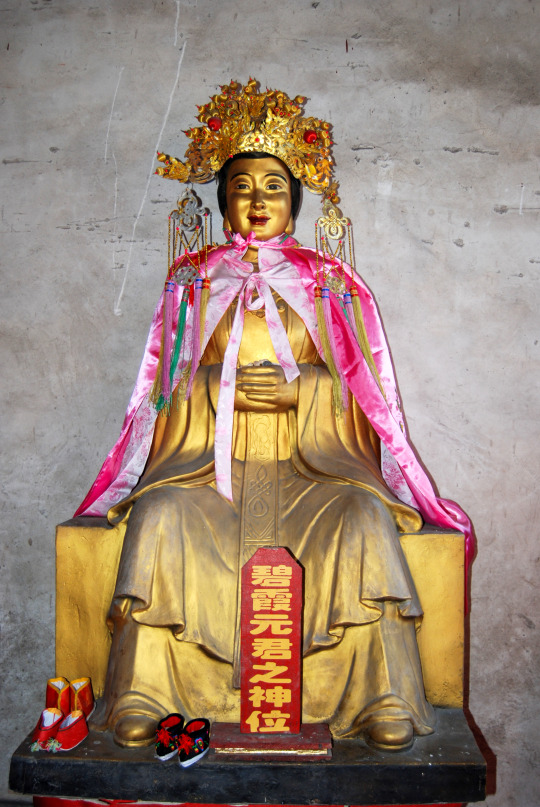
A contemporary statue of Bixia, a deity in the past associated with fox beliefs (wikimedia commons)
At the same time, foxes enjoyed a degree of popularity as objects of semi-official cult, still practiced here and there in China in modern times, for example in Boluo in Shaanxi. The religious role of foxes was reflected in, among other things, the development of terms like hushen (狐神) “fox deity”, or huxian (狐仙), “fox immortal”. The belief in such “celestial foxes” (tianhu, 天狐) was relatively common, and there is even a legend according to which there was a formalized way for the animals to transcend to higher states of existence, with the goddess Bixia making them undergo the supernatural fox version of the well known imperial examinations. If they failed they were condemned to live as “wild foxes” (yehu, 野狐) with no hope of transcendence. There are also accounts of foxes pursuing the status of a xian through illicit means, through a combination of praying to the Big Dipper and draining people’s energy, as documented by He Xiu in the 1700s. Note foxes were already portrayed as worshiping the Big Dipper during the reign of the Tang dynasty, but back then it was only believed this let them transform into humans.
The ambiguity of foxes is evident in the Japanese perception of these animals too. Supernatural foxes are probably among the best known youkai, and especially considering this is a post about Touhou I do not think the basics need to be discussed in much detail. They were believed to shapeshift and to steal vital energy, much like in China. Their positive role as messengers of Inari, a kami associated with agriculture, is generally well known too.
The earliest sources documenting encounters with supernatural foxes are obviously, as expected, the earliest chronicles like the Nihon Shoki, where they mostly appear as omens. By the Heian period these animals are well established in the written record. For instance, Nakatomi Harae Kunge includes “evil magic due to heavenly and earthly foxes” among phenomena which require ritual purification. In addition to the tales imported from China being in circulation, some setsuwa written in Japan involved shape shifting foxes. However, supernatural foxes only gained greater prominence in the Japanese middle ages due to the growth of relevance of two deities they were associated with, Inari and Dakiniten. The latter is more relevant to the topic of this article.
Foxes, Dakiniten and tengu
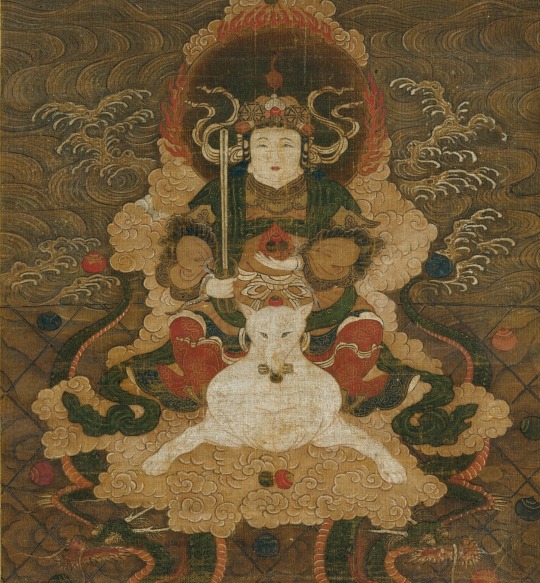
Part of a hanging scroll depicting Dakiniten riding on a fox (wikimedia commons, via MET; cropped for the ease of viewing)
The connection between foxes and Dakiniten reflected their associations with the dakinis, a class of demons in Buddhism. Originally the dakinis were associated with jackals instead, but Chinese Buddhist authors presumed that the animal mentioned in this context is basically identicial with more familiar foxes, and that belief reached Japan as well. It was strong enough for Dakinite, the dakini par excellence, to be regularly depicted riding on the back of a fox.
Dakiniten was originally a regular dakini, according to Bernard Faure specifically one who appears in Heian period Enmaten mandalas (Enmaten is related to but not quite the same as the better known king Enma, for the development of two distinct reflections of Yama in Buddhism see here). However, she eventually developed into a full blown deva in her own right, and her prominence was so great that it basically resulted in the decline of references to the generic dakinis in Buddhist literature in Japan. She was particularly popular in the Shingon school of Buddhism, and at the peak of her relevance played a role in royal ascension rituals, developing a connection with Amaterasu in the process (Amaterasu acquired many peculiar connections through the Japanese middle ages, it was par the course). A Tendai treatise equates her with Matarajin instead, though.
An interesting phenomenon related to Dakiniten is the occasional fusion of beliefs pertaining to foxes and tengu, which might have originated in the similarity of the terms tengu and the Japanese term for the already mentioned “heavenly foxes”, tenko. Its best attested examples include the inclusion of tengu in mandalas focused on Dakiniten as her acolytes. However, a different deity ultimately exemplifies this even better.
Iizuna Gongen and "iizuna magic"
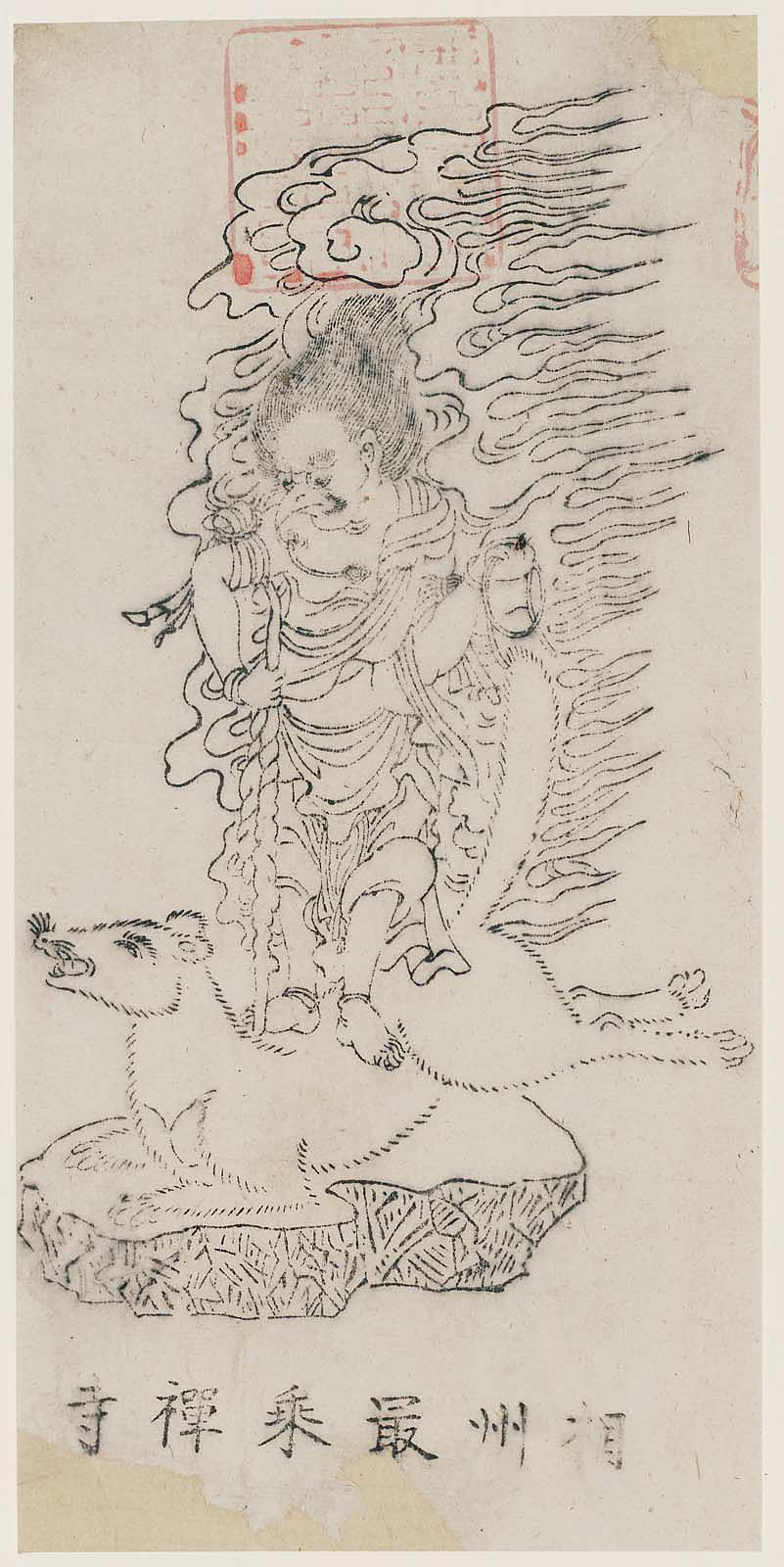
Iizuna Gongen riding on the back of a fox (Museum of Fine Arts Boston; link to the source is temporarily dead, the image is reproduced here for educational purposes only)
The indisputable center of the network of connections between foxes and tengu is Iizuna Gongen (飯綱権現), depicted as a tengu riding on a fox. As you can probably guess, he was a (vague) basis for Megumu, as evidenced by the similarity of the names. While many other aspects of his character aren’t really touched upon in the game, I’d hazard a guess he’s also the reason why ZUN decided to include a kuda-gitsune in the same game as Megumu - the evidence lines up exceptionally well, as you’ll see.
Originally Iizuna Gongen was simply the deity of Mount Iizuna (飯綱山), located in the modern Nagano prefecture. Near the end of the Japanese middle ages he spread to other areas, likely thanks to traveling shugenja (also known as yamabushi), mountain ascetics belonging to a religious tradition known as Shugendō. Two aspects of his character are particularly pronounced, his role as a martial deity and his association with foxes.
I was unable to determine when Iizuna Gongen’s connection to foxes originally developed, but it was strong enough to lead to the use of the alternate name Chira Tenko (智羅天狐; “Chira the heavenly fox”) to refer to him. Foxes also appear in a legend describing his origin. It states that he was one of the eighteen children of an Indian king, and arrived in Japan alongside nine of his siblings on the back of a white fox during the reign of emperor Kinmei (the remaining eight went to China and became monks on Mount Tiantai).
His connection to foxes is also reaffirmed in an Edo period treatise, Reflections on Inari Shrine (稲荷神社考, Inari jinja kō), which declares that names such as Iizuna Gongen and Matarajin (sic!) are used in the worship of wild foxes to hide the true nature of the invoked entities. The author further states that the true form of “these matarajin (plural) and wild foxes” is that of a three-faced and six-armed deity, which curiously has more to do with early Matarajin tradition than with Iizuna Gongen as far as I can tell. The two were not really closely associated otherwise, but it’s worth noting that apparently shugenja perceived them both as similar tengu-like deities.
The key feature of conventional iconography of Iizuna Gongen, the fox mount, has nothing to do with Matarajin strictly speaking, and likely reflects the influence of Dakiniten. However, the animal in this context developed its own unique identity thanks to the presence of foxes in a type of ritual focused on Iizuna Gongen, which could itself be referred to as iizuna. The shugenja community centered on the worship of Iizuna Gongen was not very formalized, which led to poor understanding of their practice among outsiders, with the term iizuna basically acquiring the vague meaning along the lines of “magic”. and rather poor reputation. These rites are where the kuda-gitsune comes into play.
Kuda-gitsune in iizuna magic and beyond

The kuda-gitsune, as depicted in Shōzan Chomon Kishū by Miyoshi Shōzan (Waseda University History Museum; reproduced here for educational purposes only)
At first glance, kuda-gitsune is just one of many local variants of the standard supernatural fox, similarly to the likes of ninko, osaki-gitsune or nogitsune. The etymology of its name is straightforward. I’m sure you can guess what the second half means, while kuda (管) in this context refers to a bamboo tube. You’d think the name would basically guarantee it was universally accepted that’s how one could carry such a critter undetected, but apparently there was an alternate explanation, namely that it was invisible. I have not seen any further discussion of this in literature, but I assume this might be connected to shikigami beliefs, as these quite often are described as invisible. Do not quote me on that, though. Even more bizarrely, there is no consensus that the animal meant was always a fox. According to Bernard Faure it is distinctly possible the term referred to a weasel.
Kuda-gitsune could be described as a type of shikigami, but note that this term had a much broader meaning in real life than in Touhou, and referred to basically any supernatural being which acted as an extension of the powers attributed to “ritual specialists” (祈祷師) such as onmyōji, shugenja or Buddhist monks. In Buddhist context, the analogous term could be gohō dōji (護法童子; “Dharma-protecting lads”), though there are also cases where gohō and shikigami are contrasted with each other. The shikigami category didn’t just consist of animated papercraft and animal spirits typically designated as such in popculture. Even the twelve heavenly generals defending the “medicine Buddha” Yakushi could be labeled as shikigami. Obviously, kuda-gitsune is closer to the familiar meaning of this term than to Buddhist deities, though.
People relying on kuda-gitsune were referred to as kitsune-tsukai (狐使い), which can be loosely translated as “fox tamer”, and it is said they were often shugenja. Given the popularity of the associated deity among them this shouldn’t really be a surprise.
Various supernatural abilities were ascribed to the kuda-gitsune. The ability to possess people attributed to other supernatural foxes was the domain of kuda-gitsune too. Apparently people afflicted by it were compelled to eat nothing but raw miso. Purportedly they were bringers of wealth - but said wealth did not necessarily come from legitimate sources. That, in turn, could lead to distrust or outright ostracism of people allegedly relying on foxes to acquire wealth. They also provided aid in divination, and could supposedly reveal past, present and future alike this way. However, they could look into the soul of anyone using them this way and learn their secrets. Bernard Faure notes that occasionally it was said that they even could even be utilized to kill enemies who attempted casting spells on their owner.
Shigeru Mizuki's kuda-gitsune
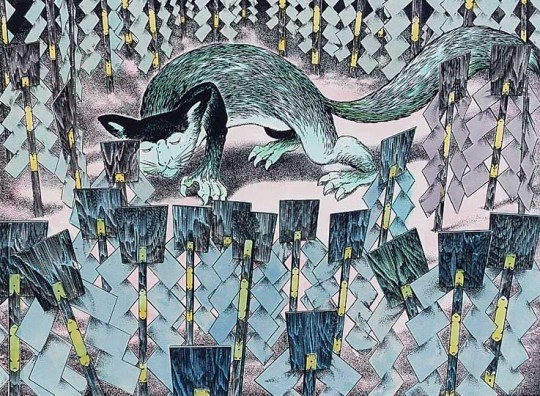
Kuda-gitsune, as depicted by Shigeru Mizuki (reproduced here for educational purposes only)
While there isn’t much information about kuda-gitsune in scholarship, especially scholarship available online in English, they received extensive coverage in various books about youkai written by Shigeru Mizuki, famous for arguably canonizing the modern concept of youkai. Note that while I am a fan of Mizuki's works, his encyclopedias are best understood as something closer to Borges’ Book of Imaginary Beings, complete with some dubious sourcing and possible fabrications. However, ultimately modern media about youkai, including Touhou, owes much to him, and arguably he continued the tradition of night parade scrolls which often invented new creatures wholesale, so it strikes me as entirely fair game to summarize what he has to say too.
Shigeru Mizuki cited the Edo period writer Matsura Seizan as an authority on kuda-gitsune. He states ccording to the latter, certain ascetics (yamabushi) were provided with these critters upon finishing their training on Mount Kinpu and Mount Ōmine. In his account cited by Mizuki there are a lot of details I haven’t seen elsewhere. The storage tubes after which kuda-gitsune are named apparently had to be inscribed with a certain sanskrit phrase (left unspecified, tragically) so that the animals didn’t have to be fed. However, releasing them and giving it food was necessary to gain their help in divination. There was a downside to this - kuda-gitsune were apparently hard to place back in containment once released without the help of a seasoned specialist. Also, they refused to provide anything of value unless fed well, and they had quite the appetite. Mizuki cites the particularly disastrous case of an ascetic who kept multiple kuda-gitsune in a single tube, and eventually couldn’t pay for enough food for his collection since the animals kept multiplying inside.
According to Mizuki it was believed that a kuda-gitsune could be gifted by its owner to another person, but the creature would come back if it was not satisfied with the food provided by the latter. If the original “fox tamer” dies before passing their kuda-gitsune to someone else, it will instead go to the Ōji Inari shrine located in what is now the the Kita ward of Tokyo.
Conclusion: Tsukasa and her forerunners
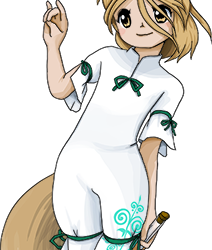
In theory I could’ve kept pointing out “see, it’s just like Tsukasa!” in virtually every single paragraph of this article. To answer the question from the title, evidently she is like that because that's how foxes have been in folklore both Japan and China for centuries.
It is not really hard to see that ZUN is genuinely great at research when he wants to be, and Tsukasa's character is remarkably accurate to her real life forerunners, both as an adaptation of kuda-gitsune specifically and as a representation of the broader tradition which lead to the portrayal of foxes as supernatural creatures of questionable moral character. She engages in morally dubious “get rich quick schemes”, she definitely provides advice (of variable quality), and her self-declared ability from her omake bio pretty clearly reflects skills actually ascribed to the kuda-gitsune in folklore. In the newest game the ability to provide information is clearly in the spotlight - Tsukasa seems to be reasonably knowledgeable (she brings up Kojiki in a line aimed at Hisami, among other things), and other characters generally agree she’d be more useful doing something else than fighting. I do not think there’s any real reason to doubt this is what is meant. I think it can even be safely assumed that Zanmu’s decision to pressure Tsukasa to partake in her assassination bluff is rooted in genuine tradition.
I’m obviously not going to say that Tsukasa reaches the platonic ideal of Okina, the quintessential character aimed at fans who like research, who largely seems to exist to get people to dig deeper for sources explaining the dozens of religious allusions in her dialogue, spell cards and design, but I do think it’s worth appreciating that the series reached a stage where even the minor animal youkai can be enjoyed as multilayered representation of centuries worth of genuine folklore and mythology.
Bibliography
-Bernard Faure, Gods of Medieval Japan vol. 1-3
-Michael Daniel Foster, The Book of Yokai. Mysterious Creatures of Japanese Folklore
-Berthe Jansen and Nobumi Iyanaga, Dākini (Brill’s Encyclopedia of Buddhism)
-Xiaofei Kang, The Cult of the Fox: Power, Gender, and Popular Religion in Late Imperial and Modern China
-Shigeru Mizuki’s assorted writings on kuda-gitsune (collected online here)
345 notes
·
View notes
Note
I've been understanding a lot of cultural subtext around MDZS thanks to you. I'd like to ask more about what makes "cultivation partners." Is it synonymous to marriage or is it a different thing altogether? From my understanding of various marriages depicted in MDZS, marriage can easily be a power move, right. I've also read about dual cultivation, but not sufficiently, and I wish to understand if becoming cultivation partners, sex, marriage - all are supposed to be exclusive stuff. like Jin Guangsham was married yet had sexual relations with plenty of people, perhaps including cultivators? JFM and Madam Yu had a complicated marriage; were they cultivation partners as well? Mianmian married a non cultivator (?) but still went on night hunts to cultivate her core. Other marriages were Qin Su and JGY, and JZX and JYL - so, I do wonder if all of these were classified as cultivation partners.
Another thing I do wonder is, from where I am, in olden times in certain dynasties it was acceptable to have many wives or spouses or marry for gains. In others, the emperor had one true wife who would repeat 7 lifetimes with him and the others were on a lower social level - ploys for expansion etc. I wonder how monogamy etc plays out in chinese context around mdzs time frame, as well as what sort of "expectations" marriage should entail?
><
Woo… that’s a fair bit. Okay. I’m going to try to answer what I can. Let’s take this one thing at a time.
1. The O.G meaning of cultivation partner:
Cultivation partner = Daolǚ (道侣)
From a lingual view, dao is path, truth, knowledge, and faith. Lǚ is a companion who shares your food, your bed, and your path. So Daolǚ = one who walks the same path in pursuit of truth, faith, and knowledge as you.
From a Daoist view, Daolǚ is a couple who cultivate together, who seek the same truth together, and who share life and death together. They don’t necessarily have to be husband and wife or lovers. They can also be family members, parent and child, or shifu and dizi. They can be of different sexes or the same sex. All of those are only accessories to the OG meaning.
The core of Daolǚ is “ones who seek the same truth.”
This video is from a master Taoist answering the question, “Are Dao couples husbands and wives?”
http://baike.baidu.com/l/nBoL850d
2. So why did MDZS use Daolǚ when talking about married couples? AKA a stealth reference to a real-life historical split in opinions:
The first time the topic of Daolǚ comes up in the novel is during the Cloud Recess era when Lan Qiren taught the history of the Lan ancestor, how Lan An met his Daolǚ, and together they created House Lan. Then the students started discussing their future Daolǚ, which eventually led to the fight with Jin Zixuan.
Daolǚ, in this context, definitely sounds like a different word for a married couple in the setting. Why?
Well…. Because there is a historical split in opinions regarding what Daolǚ really is in practice.
Of course, if we are only talking in theory and lingual origin, then the married or sexual aspect just doesn’t come into play. But in real practice, this kind of close proximity inevitably ends up becoming (or is born out of) actual physical, emotional, and sexual intimacy.
Think about it. The one who shares your faith. The one who shares your path. The one who holds the same ideal. The one who shares your food, your life, your bed. The one whose life and death are intertwined with yours. The one who will walk with you to the very end, wherever it may be. The one whose soul is literally linked to yours through shared cultivation.
You don’t really get this kind of exclusive, super intense, intimate relationship from anywhere other than a married couple. Of course, there are exceptions, but they are, by and large, exceptions that prove the rule.
It’s very funny because even in the official Baidu entry for Daolǚ, beneath the super official definition provided by Daoism associations and sourced from some of the most credible historical texts that survive to this day, even they had to admit in the modern understanding, and especially in media portrayal, Daolǚ is used almost exclusively to refer to Daoist couples in every way that a regular couple can be. Even funnier, if you go and search for the term 道侣双修 (Daolǚ dual cultivate) in the book section, it turns up some 4300 titles concerning Daolǚ dual cultivation. And a very significant portion of those 4300 titles aren’t actually entertainment media at all, but actual historical texts, modern research, and serious treatises written by reputable modern Daoists on the subject.
Okay. So then, why not just admit that outright? Why the extra step? What’s there to disagree about?
Well, because sex is icky.
Hahahaha! But no really…
3. Dual Cultivation aka Magic Sex:
And here we are at the crux of the historical split of opinions.
Dual Cultivation aka Magic Sex (eyebrow waggle!).

From Daoism's founding point, the idea of harmony between Yin and Yang has been one of the founding precepts laid by Laozi himself. There’s not a single reputable Daoist school that disagrees with this precept. The disagreement comes from the interpretation of this precept instead.
From very early on, there were already schools that believed in the application of Yin Yang harmony to manifest as the physical and spiritual relation between men and women (or Yang bodies and Yin bodies).
How early are we talking? Well, BCE kind of early. The earliest text that teaches sex art as part of Daoism is a pre-Qin-dynasty book named The Dao of Huangchi 黃赤之道. This text was later religiousized by various schools of Daoism.
Before the 10th century, there was not much disagreement at all among ancient Daoists about the sex part.
Sexually explicit dual cultivation only became an issue sometime around the Tang dynasty forward (618 - 906 CE). Why the Tang dynasty? Well, that’s around the time Daoism became bourgeois. Before Tang, Daoism was the religion of anti-authoritarian hippies (for lack of a better word). Yep, they were very screw-the-government, let-me-have-my-weed-and-intense-sexercise-while-high kind of people (I’m not even kidding).
One of the earlier records of Daolǚ dual cultivation after the bourgeois-ification of Daoism that still survives to this day is Wu Zhen Pian by Zhang Boduan from the 10th century. Around this same era, numerous sects and schools adopting the same practice of Daolǚ dual cultivation (sexually explicit at that) sprouted up, such as: Shuangxiu Sect, Fangzhong School, etc…
The Wu Zhen Pian, despite being a fairly cryptid text, also explicitly referred to the “places where the body is first given qi” as the male and female genitalia. So there really isn’t any room for misinterpretation as to what exactly it was speaking of.
Around this same era, the disagreement around dual cultivation being sexually explicit and Daolǚ being 99.99% couples became very intense… as in sect war kind of intense.
Ancient High Chinese society was, by and large, very “performatively” puritanical. So from the time Daoism started rubbing shoulders with kings and rulers (instead of eschewing them as the literal founders of Daoism taught), they also started eschewing their fairly sexual, anarchist roots.
Ergo… the ideological schism.
This schism would split between diehard, purists practicing Daoists from the more neutral ones that used Daoism as a political tool as well.
4. A history of sexual exploitation:
Okay, so sexy Daoism is the pure, root Daoism. Why isn’t it the one being preached as official these days?
Because… as usual, whenever there’s a great idea, some chuckleheads somewhere would come along, bend it around its knees, and abuse it instead.
Think about it for a moment. Daoist sects in ancient times were steeped in mysticism. Many of them were powerful and rich. You throw in the sex element. It’s extremely easy for exploitation to happen.
Cults are some of the oldest things in the history of mankind. Sex cults aren’t new, and they aren’t rare, either. Charles Mansion of the Mansion family is just one in a very, very long string of such things.
Let’s just say that for many reasons and many factors, pure Daoist schools practicing sexually explicit dual cultivation also tended to have a checkered history and that along with the historical transformation of Daoism from an anarchist religion to a state-sponsored philosophy massively discredited them.
To this day, you can still trace this history of exploitation down to modern media concepts such as “Human Cauldron,” which is the term denoting a human being used as a sex slave and a cultivation tool by another cultivator. You would think that’s a modern media invention… but no… this term has a long and dark history. Forgive me but I don’t exactly want to go into details in this part.
5. So, what does this all have to do with MDZS?
Well, you can use this context to understand how concepts like dual cultivation and Daolǚ are interpreted and practiced by different people within the MDZS world. MDZS is based in Wei Jin period, which was a period of transition, chaos, and clashing ideologies. You can kinda see that complexity in the way a concept like Daolǚ seems so… mixed and different between theory and practice.
When you really get down to it, there are two ways to understand Daolǚ. 1/ Those who share the same mind, the same faith, the same truth. And 2/ Those who are boinking magically.
Do Wangxian meet these requirements? Yep, both of them. I think that’s pretty clear. Near the end of the story, when Wei Wuxian said his goodbye to Wen Ning and Lan Sizhui, he also remarked about everyone having their own “road” to walk and that, in the end, only one person walked the same “road” as him. That person, Lan Zhan, was also the one person he wanted to walk with. (I don’t have to provide a snap for this, right? People aren’t going to shoot out of nowhere and accuse me of not providing adequate citations, right?). Dao is road. So that’s another nod to the fact that Wangxian are Daolǚ in every interpretation of the concepts (And yes, I’m totally into the interpretation that their boinking is, in fact, magical and working to stabilize Wei Wuxian’s cultivation! Look at the Japanese art featuring Wei Wuxian with the blue cloud patterns on his body! Clearly, lots of people agree with this interpretation! You can’t convince me otherwise!).
What about Jiang Yanli and Jin Zixuan? Are they Daolǚ? Ehh… it’s kind of a toss-up, isn’t it? There’s not really much in any permutations of MDZS (with maybe the exception of the live-action) that either supports or disprove. I think if you want to interpret them as Daolǚ and Jin Zixuan would eventually help Jiang Yanli cultivate a Jindan and be able to stay young alongside him, you definitely can do that. Or if you want to see them as a more traditional, ordinary husband and wife couple, then that’s a valid interpretation too.
Jin Furen and Jin Guangshan? Ehhh… the above paragraph applies… although… geee… I really don’t see them as either pursuing the same truth or… exclusively boinking magically or that either is using the other as a human cauldron… although that doesn’t disqualify Jin Guangshan himself from using that for his sexual escapade? But then why would he die to marathon sex? I guess Jin Guangyao is hax enough?
In any case, I’m going to stop here. I’ve been sick for the past three weeks and my work has been really demanding. I really tried hard to reserve some free time to write. So the things I have not answered, can you come back to me another time and I will, when I find the time and full citation materials, write a separate reply?
Have a great day!
Oh, also… just as a disclaimer, please don’t use my writing for fandom strife or anything like that. I only very recently found out there were people using my writing for… well… Let’s just say I’m not for that. If anything, please use my writing for creative purposes or just to learn something new!
268 notes
·
View notes
Text
Fox Spirits In Medieval Narratives: Gender Bias
The domestic worship of the fox described by Zhang Zhuo informs us that the fox spirit occupied an ambivalent position in family lives. That foxes were enshrined in private quarters and offered food consumed by humans suggests that they participated in the family as insiders. However, their supernatural power and animal nature inspired both reverence and fear, and preserved their identities as…
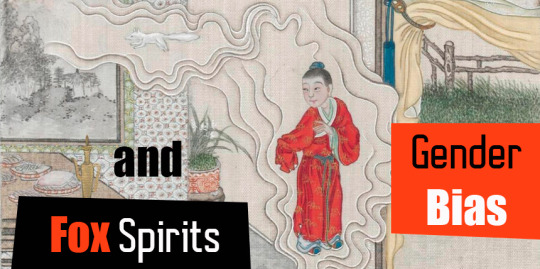
View On WordPress
#ancient China#Chinese culture#Chinese fairy tales#Chinese folk religion#Chinese history#Chinese mythology#fox#Nine-tailed fox#spiritual animal#Tang dynasty#Taoism#Taoist magic#Taoist practices
172 notes
·
View notes
Text
𝐗𝐢𝐞 𝐋𝐢𝐚𝐧 × 𝐌𝐚𝐥𝐞!𝐑𝐞𝐚𝐝𝐞𝐫 × 𝐇𝐮𝐚 𝐂𝐡𝐞𝐧𝐠
Synopsis ― Oh, the irony of three people hiding their identity from one another, and yet knowing exactly who each other are. And sleeping in one bed as well, it can get very cramped.
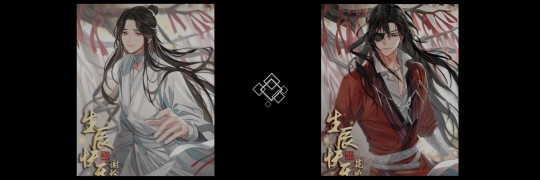
Info on Reader: Reader is intended to be AMAB, Reader is intended to be a Martial God (but can be a Civil God that knows a thing or two) and one of Xie Lian's close friends/confidants, Reader does not express his opinion on Hua Cheng (just wary), and Reader is in a robe of some sort (to pass as a Taoist Priest with Xie Lian) and the body is not the original/is camouflaged (hiding the true self, like Hua Cheng with San Lang).
Info on Timeline: Post-Ghost Bride, and San Lang just started to stay to fix up the place. The Reader stayed around to watch over Xie Lian, Xie Lian encouraged this.
Fujoshis do not interact. || Enjoy!

HuaLian × Male!God!Reader | Sleeping Arrangements, Night One
Nightfall in the valley of a mountain can be cold and the winds harsh during the later seasons, but Xie Lian had truly found a small piece of paradise that surrounded itself in foliage and hills just right to carry wind away from the rickety temple. The windows weren't fully covered and only paper thin blinds on a nail were keeping passersby from being able to watch them at night, but you knew it wasn't what was outside that left you feeling exposed and open. That feeling was something of an unknown new person in this temple, burning your throat and chest with his overwhelming presence at times.
The feeling was San Langーthe young man Xie Lian met on the road home from a supply runーstaring right up at you as you tried to sleep upon the straw mat Xie Lian had for a bed in this place. You could feel the blood orange eyes upon your sleeping face, piercing your meridians with aura alone, as you measured your breaths to keep your facade of slumber up.
These signs of distrust on San Lang's part for you hadn't been present in the last few hours, and you almost forgot there was a stranger in this beat-up home with you and Xie Lian. During sunset, your dinner preparation had been interrupted by a horse-drawn carriage, an acupunctured villager, and a new local being offered your limited resources. Needless to say you had scolded Xie Lian for his carelessness in bringing in another mouth to feed: you could continue to practice inedia for tonight, but with how long he's gone without food, Xie Lian would have to indulge your cooking... and you really hadn't made much to begin with. Your edible resources (or lack thereof) could give away you both were more than you seemed, but thankfully San Lang wasn't hungry and departed for the night before your scolding had begun.
San Lang had been rather cordial yet charming at his departure last night, but had been quite a bit of a pain to you this morning when he showed up. He seemed so smitten with Xie Lian, you have half a mind to think this mischievous behavior was payback for lecturing Xie Lian so late last night...
Yet, time passes, and morning turns to night. And the dreaded question of sleeping arrangements comes up as San Lang wishes to stay.
Xie Lian had put away the pottery he had collected as he noticed the time just after you did. "Yes, I could go to sleep as well, San Lang. Let us just get... the..."
You and Xie Lian both have the expressions of surprise, dread, and embarrassment thrown at each other as it dawned onto you both; you had neglected to make another mat for yourself today as you had planned, and your only one would have to do.
After all you had suspected of San Lang throughout the last night with Xie Lian, you didn't exactly expect him to stay the night. But San Lang―true name and identity unknown―didn't look put off or displeased with your breaking news at all. If anything, the smile on his face only grew into something smug before disappearing back into something more soothing.
It was far from soothing...
There had been a bit of true peace between you three shortly after you all laid upon the mat. You had been first to choose without the other two really getting a say and you ended up taking the center and laying upon your back, at least trying not take up too much space. It was a safe and smart idea for yourself, you justified, when you believed San Lang had some sort of interest in Xie Lian. With how he clung to his side since simply meeting him yesterday, you thought Xie Lian a target of some sort.
But now, with the young man breathing down your neck and shoulders, you wonder if you had been lured in. San Lang had laid down like he had a purpose on your right, and you can tell he was far from displeased as he rolled into his side to basically lay his ear on your shoulder. His excuse of the wall being so close for fear of hitting his head or back had been smart, but it didn't really ease your skyrocketing senses as you became sensitive to his vitals.
Human breathe. Body heat. Stable heartbeat. You can feel all of this on your shoulder and arm, and you can tell whatever disguise this might be... was very good.
San Lang's smug smile flashed just briefly again, while Xie Lian was taking off his working boots and had his eyes everted.
...
... You knew San Lang had been too happy to lay upon your right side against the wall, practically smug as he laid on his side to face you and Xie Lian fully...
After he was finished, Xie Lian had laid upon the outside―your left―and had done so on his back like you had, likely as well for his paranoia, but you couldn't tell with that radiant smile. The Scrap God gave you both a sheepish laugh as he turned to you two then, uttering a, "I'm very sorry it's cramped. We'll make sure to accommodate you properly in the morning, San Lang."
San Lang, draped on your arm in the image of an alluring beauty from erotic paintings, seemed pleased where he lay, "I'm very sorry for the intrusion. I'll make sure to pull my weight in the morning, as I am the guest."
In their discussion back and forth about repayment for room and board, you had quickly become obsolete after they brought back the topic of what happened last night, and you had deemed the situation handled and closed your eyes as they talked over you. You were unsure if you were able to make your body rest and simulate sleep while San Lang was on you, but Xie Lian's presence alone had seemed to temper whatever the other felt towards you, and you took this chance to try.
Try, was a brave word.
And sadly, it seemed only Xie Lian had any luck at his attempt to rest.
For now, the other God was asleep as far as you could tell, and had rolled over to face you and San Lang, body just shy of fully draping over your last remaining arm (you couldn't care anyways, your arms had strong meridians flowing and wouldn't go numb with weight alone). But you did notice the absurdity of both your bedmates laying upon you just shy of when you could feel a strong, overpowering gaze tracing your... everything.
San Lang, it seems, won't go to sleep so easily as well. If he even could.
You could feel your aura flair, and the air just slightly too still for your liking. You weren't prey, because you'd never allow yourself to be so vulnerable, but then what was this inaction? Did you fear that unknown person against your clavicle? Or were you anticipating something unknown to your perception of him to happen... ? Did you expect to wake up suddenly and see San Lang passed out, fast asleep and huddled to the wall?
You can feel the warm breath of San Lang (should a ghost's breath be so warm as to make your skin so heat?) slow just slightly, before it stops. You're sure he's doing it on purpose to tease you, before the next time a breath washes your neck, a whispered voice carries with it.
"My, you're a terrible liar..." San Lang sounded amused. "You're so stiff in your sleep, I almost thought you dead. You're basically grabbing onto him. I expected better from you..."
You wanted to open your eyes and give a soft glare at the crimson wearing man, to ask him what he meant and to try and unpack the statement you'd just heard. But you didn't have time to process how you were going to go about this, much less how to not wake Xie Lian beside you, when movement on your far left side gained your focus.
Xie Lian was awake? When a hand you hadn't felt on your robes suddenly gripped it just a tad bit too hard right above your stomach, you knew it couldn't be anyone else. San Lang's own hand against your arm told you who it must be, so far to your left an inverted grip on you was a dead giveaway to it being Xie Lian's. But why was it balling up your robes so protectively?
The callused, yet gentle hand gripping your robes led to a soft, familiar voice answering back to San Lang. The whisper said, "I did not lie. I simply said I was going to bed... I didn't say I'd sleep." He sounded more sheepish then offended, perhaps knowing somewhere inside him this was a useless debate.
"Yes, you did." San Lang laughs lightly, sounding very assured of this. And he was right. "But what I'm really talking about was what you said about your... roommate here."
"What did I say about him? I will be honest, I talked... a lot, today. You make it so easy to just talk." Xie Lian's expression at the moment didn't come to your mind, as his tone was inquisitive. His tone was far from harsh, but that grip on your robes was something harsh.
San Lang didn't seem the type of man to allow flattery to get anywhere with him, not even your earlier compliments on how effective he was at cutting wood had affected him. But San Lang seemed to have a soft spot for Xie Lian, and any compliment was basically soaked up like water to dry soil. This seemed to be no different, even if you couldn't see their faces.
"Why thank you, I try really hard." It sounded like he actually did enjoy that compliment, from how smug he sounded. "But about him, I meant what you said during the ghost march... how your roommate was just some nobody just like you. At first, I could see it. Now, I don't buy it."
You would have held your breath if your body wasn't already in the rhythm of a fake-slumber. You can feel a familiar hand from San Lang's side of the bed, one previously upon your arm, come up to cup your chin in a feather gentle touch.
"I think you said something about both of you just meeting each other a short while ago, deciding to settle here because of your shared interest." The touch was chaste yet steady against your skin, and you can feel light callouses on the tips of his fingers. "From how you act, I couldー"
Just as the hand feels like it was about to start dragging itself across your jaw, you feel another hand reach to grab at it and mostly jostled it from where it holds you. But something so forceful was not expected and you jumped at the clap right below your chin. Nothing had hit you, but damn was it close.
You guess that was enough spying for one tonight.
Opening your eyes as your facade of sleep could no longer be believable, you are met with both of the joined hands and the faces of your two bedmates noticing your awake. The look between them before they focused on you was one of pleading (Xie Lian) and searching (San Lang), and then Xie Lian regarded you fully with a sheepish expression.
"I'm so sorry, my friend, we seemed to have woken you up..." Xie Lian's face heats right on his cheek bones, and you can tell he didn't want you seeing him like this. "San Lang... just needed his shoes, it was getting cold."
San Lang himself just rolled off of you to lay upon his back―seemingly not carrying of the wall right at his side―but his slightly smug smile did not wipe as he flipped back. He didn't say anything; he didn't agree or disagree with Xie Lian's statement, leaving the Scrap God to make up the excuse.
You can tell your face showed it did not believe him, when he coughed awkwardly into his sleeve. And San Lang let out a small belly laugh at the quiet that follows.
#Heaven Official's Blessing#Tian Guan Ci Fu#TGCF#Reader Insert#Male Reader#HuaLian#HuaLian x Reader#HuaLian x Male Reader#Xie Lian#Hua Cheng#San Lang#Xie Lian x Reader#Xie Lian x Male Reader#Hua Cheng x Reader#Hua Cheng x Male Reader#San Lang x Reader#San Lang x Male Reader
1K notes
·
View notes
Text



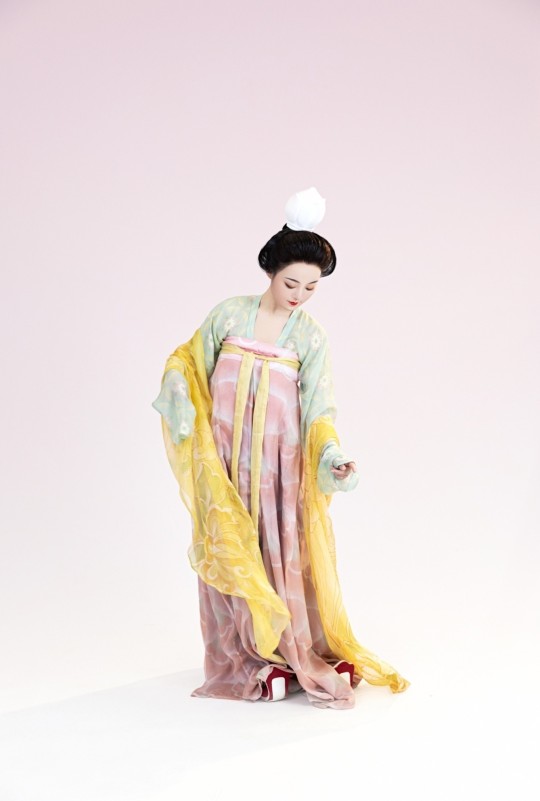






【Historical Reference Artifacts】:
China Tang Dynasty Lotus Crown Female Figurines,Collection of Xi'an Museum

China Tang Dynasty Murals from Prince of Ning Li Xian(李憲)Tomb Mural (742)

[Hanfu · 漢服]Chinese Tang Dynasty(618–907AD) Traditional Clothing Hanfu & Hairstyle Reference to Tang Dynasty Figurines
【History Note】
Wearing a lotus crown is a symbol of Taoism.Until now, Taoists still wear lotus crowns when performing Rituals and only high-level Taoist priests can wear lotus crowns.

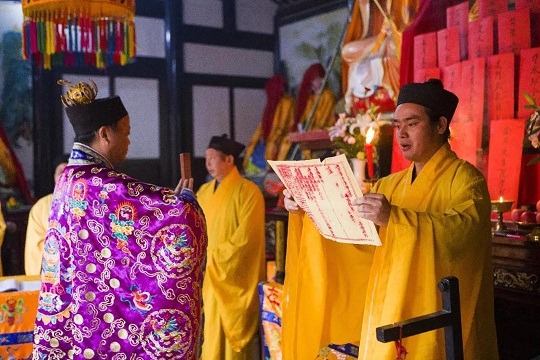
Generally, the Taoist priests we see are all male, so many people will misunderstand that Taoist priests can only be male, but this is a wrong statement.
As early as the Jin Dynasty(266–420), the first female Taoist priest appeared: 【Wei Huacun 魏华存】。
Wei was born in 252 in Jining, Shandong in the former county of Rencheng (任城). Her father, Wei Shu (魏舒), was a government official. From an early age she displayed a propensity for studying the works of Laozi and Zhuangzi, and practising Daoist methods of cultivation.
At the age of 24, she was married to Liu Wen (劉文) against her will by her parents and had two sons. After they grew up, she resumed her Daoist practices. At some point she became a libationer in the priesthood of the Celestial Masters sect of Daoism.
Except Wei Huacun, one of the four beauties in China, Tang Dynasty beauty: [Yang Guifei杨贵妃/Yang Yuhuan杨玉环] also used to be a Taoist priest for a while.Her Taoist nun name is Taizhen (太真).
Therefore, it is speculated that she was also wearing a lotus crown when she was a Taoist priest.

In the middle and late Tang Dynasty, lotus crowns were not only worn by female Taoist priests, but ordinary women also liked to wear them. Until the Song Dynasty, the crown worn by women were not limited to the shape of the lotus, and even the material changed, such as: ivory, jade,and so on.
—————————–
🧚🏻Recreation Work: @我是411
🌸Lotus Crown:@时春居荷包
👗Hanfu:@墨名堂的箱掌柜
🔗Weibo:https://weibo.com/2040114485/N7EPOiEHN
—————————–
#chinese hanfu#Tang Dynasty(618–907AD)#hanfu#chinese traditional clothing#hanfu accessories#hanfu_challenge#chinese#chinese history#Taoism#female Taoist priests#lotus crown#china#historical fashion#historical hairstyle#chinese fashion#我是411#时春居荷包#墨名堂的箱掌柜
160 notes
·
View notes
Text
Legend VS LMK Characters:
Kui Mulang (LMK):

[Kaui Mulang, Guard of the Celestial Court, Mansion of the White Tiger, Devourer of Earthly Souls]
Korean: Gyumokrang Mandarin: The Wood Wolf of Legs
Former Celestial Guard turned Yellow-Robed Demon.
After Falling in Love with Jade Maiden and having their love rejected by the Celestial Realm. He gave up their immortality and he awaited for her to reincarnate. As he waits to make sure he will be there to see her he consumes mortal lives to longavit his own.
The 28 Mansions mentioned by him are part of the Chinese constellation system as to why there is so much star imagery is in his castle.

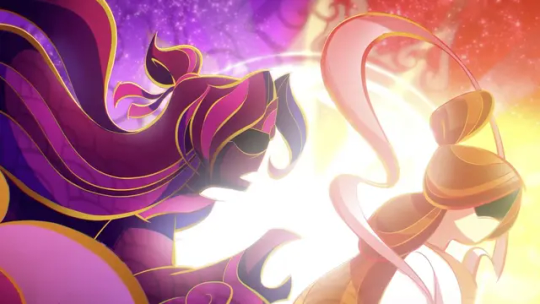

Kui Mulang (Ledgend):
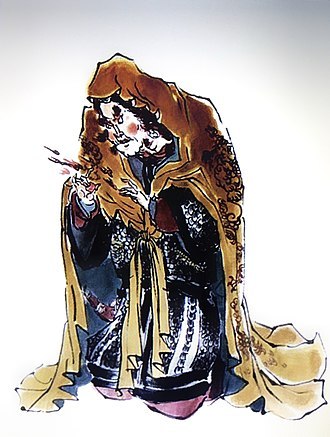
Kui Mulang originated from the ancient Chinese worship of the constellations, a spiritual practice that combines Chinese mythology and astronomy. He is considered to be one of the 28 Mansions, which are Chinese constellations. These are the same as those studied in Western astrology.
He appears in Chinese mythology literate notably the JTTW & Fengshen Yanyi.
He is linked to a historical figure called Ma Wu, a general who hailed from the town of Huyang in Tanghe, located in the Henan province.

Kui Mulang is associated with the constellation Andromeda, which appears in the sky in the middle of November. In this constellation is Kui Xiu, described as the "four-legged fish palace" of Heshansu (和善宿) because its shape is similar to a fish. Another constellation, the White Tiger, is also associated with this cluster of stars.
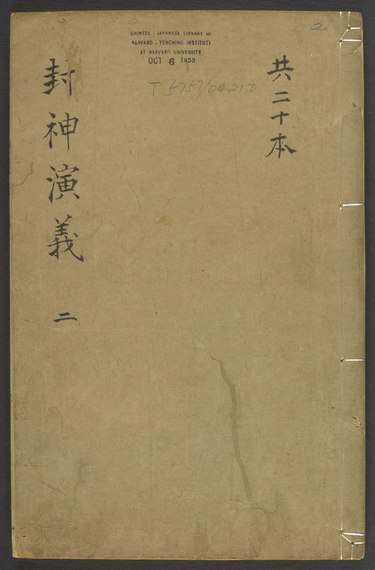
According to the novel Investiture of the Gods (Fengshen Yanyi), Kui Mulang was originally named Li Xiong. After he died in the Battle of the Ten Thousand Immortals, Jiang Ziya deified him as the Wood Wolf of Legs, one of the twenty-eight stars.
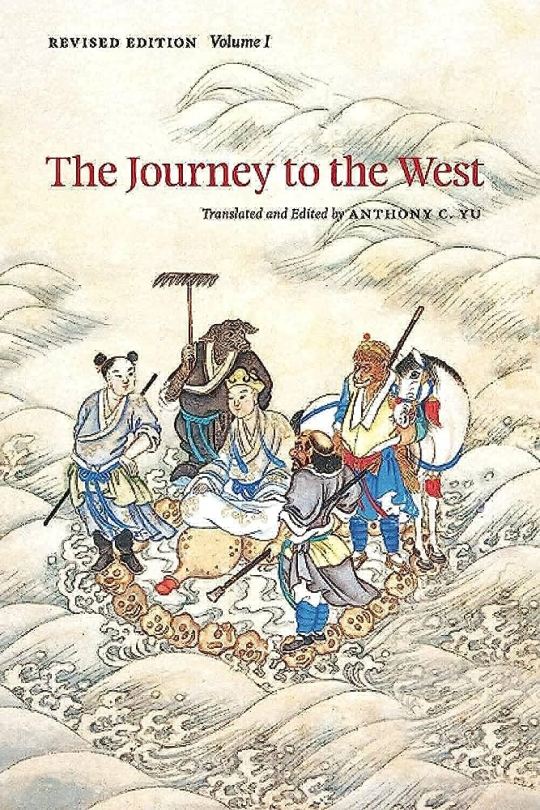
In JTTW
Kui Mulang appears as a demon named Yellow Robe Demon . He lives the Moon Waves Cave on Bowl Mountain in the Kingdom of Baoxiang. In his past, the Yellow Robe Demon falls in love with the Jade Maiden in Heaven and decides to elope with her. He becomes a demon lord and the maiden is reincarnated from a goddess to a human who is named Baihuaxiu . She is the third princess of the Kingdom of Baoxiang. The demon then kidnaps the princess, though she has no memory of her existence as a Jade Maiden. He marries her and the couple has two children.
Sun Wukong manages to defeat the demon, which mysteriously vanishes after his defeat. Wukong then seeks help from Heaven to track down the demon and learn his true identity. The Jade Emperor discovers that one of the 28 Mansions is missing, so he orders the remaining 27 to subdue the demon. The demon is revealed to be a disguised as Revatī, the Wood Wolf of Legs, a star deity in the heavenly court, and one of the 28 Mansions. The Wood Wolf is then subdued and brought back to Heaven. As punishment, he is ordered to become a furnace keeper under Taishang Laojun.
Jade Maiden:
Considering she is a huge part of Kui Mulang's life I thought maybe also some info about her as well.
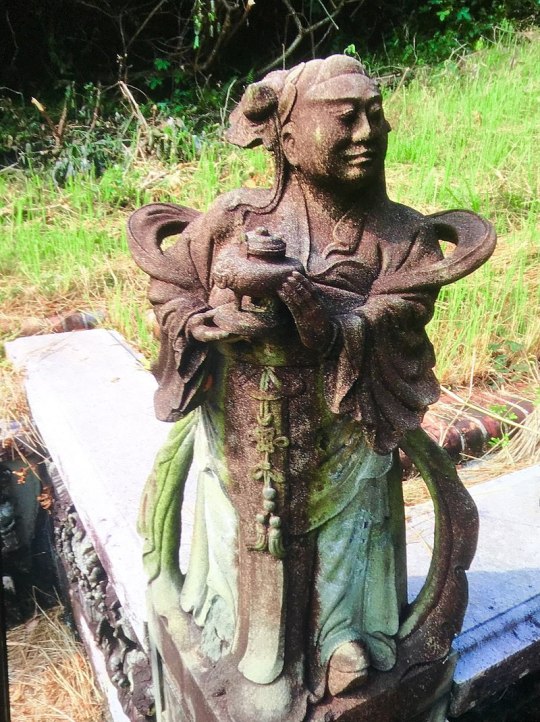
[ Yunü / Jade Girl or Jade Maiden]
Yunü is a common designation for a beautiful woman or, in Daoism, for a fairy or immortal
A Taoist deity or goddess in Chinese mythology and Chinese traditional religion who, along with her male counterpart Jintong (Golden Boy), are favored servants of the Jade Emperor and Zhenwudadi.
They are also believed to serve as guides in the underworld and the protectors of houses and temples. Some of the Golden Boy and Jade Girl pair could be found on some graves at Bukit Brown Cemetery as they are believed to serve as guides in the Spirit World or the Underworld.
During the spring festival, pictures featuring the two can be found on the doors of many households.
This couple helps virtuous souls over a golden bridge to paradise and helps souls whose good deeds outweighed the bad, over a silver bridge to paradise. Therefore by erecting the Golden Boy and Jade Maiden by the grave of the deceased, living family members hope that the deceased will not venture into the courts of hell but instead lead their afterlife in paradise.
Yunü and Jintong have appeared in several stories since the Song and Yuan dynasties and have become important figures in Chinese mythology.
There are several mountain peaks bearing her name.
In Journey to the West, Yunü is a servant maid of the Jade Emperor in Heaven. She falls in love with a star god called Kui Mulang and decides to elope with him. However, she doesn't want to ruin Heaven's pureness, so she decides to reincarnate as a human. She enters the human world as Baihuaxiu, the third princess of the Kingdom of Baoxiang.
In Other Literature:
Specific examples are the southern opera version of the legend, Jintong and Yunü, In this context, Yunü is called Longnü and Jintong is called Shancai Tongzi. According to the Shenyijing, Yunü and her companions loved to play touhu, a Chinese game in which arrows or darts are thrown into a vase.
In the Avatamsaka Sutra, she and Jintong seek enlightenment and are acolytes of Guan Yin. In this context, Yunü is called Longnü and Jintong is called Shancai Tongzi.
Some folktales say that Xue Dingshan and Fan Lihua were originally the Golden Boy and Jade Girl. The Jade Emperor was furious with them and wanted to punish them for breaking the celestial utensils. Fortunately, the Old Man of the South Pole begged for their mercy and was demoted to the mortal world.
In the Hanyi ji play, the protagonists Qi Liang and Meng Jiang are reincarnations of Jintong and Yunü.
In most popular versions of The Butterfly Lovers, the protagonists Liang Shanbo and Zhu Yingtai are human reincarnations of Jintong and Yunü who are expelled from Heaven Court by Guanyin or the Jade Emperor for their sin and forced to live as a thwarted couple for three or seven generations before being reunited and restored to their original status.
Thoughts:
Yunü has a lot of love and being kicked/leaving heaven tales.
But did love she was more than just known for this story alone.
The JTTW and LMK versions of Kui Mulang are not too different. However, in the retelling of their love tale he only mentioned himself ridding them of their immortality it almost sounded like in that tale she might have had second thoughts and he did it by force. But I hope not but we can never know because the LMK changed a lot of the characters and tweaked some backstories.
I think the real change in the LMK is that Kui Mulang captured Ao Lie before the JTTW. From the way he talked about the Jade Maiden, she had not been reincarnated or at least he had not captured her yet. For Ao Lie It had to be after his banishment of course because he talked about his powers causing damage he felt bad for aka when he burned his dad's stuff.
Well, I hope you, readers enjoyed:)
#lego monkie kid#jttw#lmk#fan thoughts#journey to the west#lego monkey kid theory#character study#kui mulang#jade maiden#chinese mythology
118 notes
·
View notes
Text
Practicing the basic skills of Tongbeiquan . Rolling, chopping, hanging, unloading, cutting, sweeping, stretching, fisting, and probing. Tongbeiquan 通背拳(Spreading Power from the Back Boxing"), as tong means "through," bei means "back" and quan means "fist") is a school of martial arts popular in northern China, known for engaging opponents from maximum distance.Tongbeiquan's basic precepts are Taoist in nature and many of the training methods in Tongbeiquan are similar to those of the internal styles.
#kung fu#wushu#chinese martial arts#kung fu girl#martial arts girls#chinese culture#kung fu world#martial arts
115 notes
·
View notes
Text
Wu Wei: The Taoist Principle of Action in Non-Action
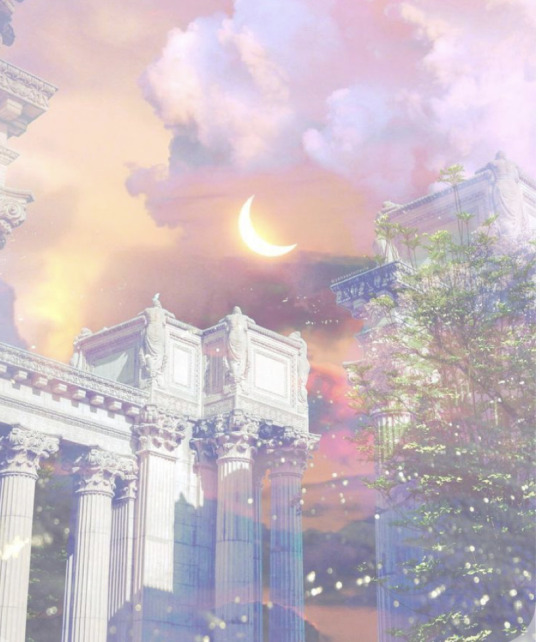


This concept has been around for thousands of years, and is a major component in the philosophy of Taoism. It is a call to practice non-intervention and non-resistance in everyday life, encouraging an effortless flow in one's actions and interactions.
Rather than striving for a desired outcome or forcing change, Wu Wei invites us to accept what is and remain open to the unfolding of our lives. We can observe without judgement and seek understanding without manipulation. It can be easy to become overwhelmed with life's problems and challenges when we focus on our desires for things to be different. But in Wu Wei, we learn to simply "be" in the moment and savor the beauty of it.
In Wu Wei, every action is connected and has an effect, even when it appears that we are not doing anything. We can practice being mindful and present in our daily lives, with a calm trust that all will unfold as it must. We can acknowledge what we need to do but not become attached to a particular result, understanding that the outcome may be very different from our expectations.
In summary, Wu Wei is much more than simply inaction. It is an active practice requiring deliberate intention and presence. To truly embody Wu Wei requires us to be aware of our actions and reactions in every moment and to make decisions based on our innermost truth rather than external forces. This way of living allows us to be more connected with ourselves and find harmony within our environment.
So how do we apply Wu Wei to manifesting?
To put it into perspective, have you ever noticed how when you’re not paying attention to something you do it better. Wether it w dancing, singing, or mundane work, if I’m not actively paying attention to said activity, it gets done the best way possible.
To use this principle into spiritual practices First, it’s important to get clear on what you want. So take some time to get really specific about what you want to attract into your life. Visualizing your desired outcome can be a great way to keep that focus.
Once you’ve done this, the next step is to be open to the infinite possibilities that exist within the universe. Surrender to the idea that you don’t know all the possibilities that are available for you – and it’s because of this openness that the universe will start moving in the direction of what you desire.
At this point, start doing things that will bring your desired outcome closer. This could be doing research on the topic, or making connections with people who can help you out. Take action with intention and from a place of power. Additionally, take note of any signs or opportunities that suddenly come up- these are your affirmations that the universe is leading you in the right direction.
Finally, let go of expectations and trust in the process. Don’t try to control or manipulate anything- instead let the flow of life take its course, and if it doesn’t happen right away, trust that something better is coming your way.
Applying Wu Wei to manifesting is all about believing that the universe is on your side and will provide what you need when the time is right. With just a bit of conscious thought and effort, you can trust that what you desire will come into fruition. Using this I’ve practically been able to attain whatever I want. It’s easier said than done but with practice I believe it’s not only good for your mind and stress for achieving your goals, but is pretty efficient and liberating :)
#law of assumption#void state#manifesation#manifesting#reality shifting#law of attraction#shiftblr#self concept#shifting
188 notes
·
View notes